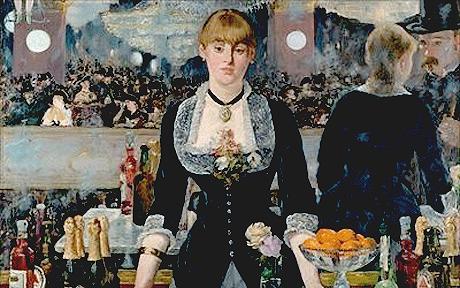Initial Reaction
The painting “A Bar at the Folies-Bergère” is a masterpiece by Édouard Manet. The initial reaction about the painting is that it is full of ambiguity and doubt. It is notable that the painting shows real life in a bar (Neale, 2012). The painter portrays a barmaid who is ready to serve every customer. The inclusion of an imaginary mirror delivers an unanticipated mystery to the audience. The portrayal of a mirror in work is what has interested me the most.
Manet paints a lifelike view of a bar and adds the mirror to present the unexpected ambiguity (Mallarme, 2010). The objects portrayed in the mirror are different from what the viewer sees. This approach makes the painting mysterious, funny, and admirable.
Analysis of the Work
The work “A Bar at the Folies-Bergère” was painted in 1882. The masterpiece was one of the greatest works by Manet. It should be observed that the artwork embraced the concept of Realism. This movement was “characterized by the truthful representation of subject matter” (Mallarme, 2010, p. 29). By so doing, many artists of the era avoided most of the conventions and stylizations associated with earlier movements of art such as Romanticism.
Artists of the Realism movement favored real-life depictions over-romanticized ones (Mis, 2007). In order to achieve their objectives, these artists used ordinary people and surroundings to produce their works. This fact explains why many painters portrayed ordinary laborers in most of their artworks. Neale (2012) argues that many “Realists used simple and un-prettified detail to portray ordinary life in the society” (p. 46). These aspects explain why Édouard Manet’s “A Bar at the Folies-Bergère” is a good example of a realist masterpiece.
The artist’s biography offers numerous insights that can be used to understand this painting much better. Manet was born in 1832 and died in 1883. During this period, many European nations were focusing on the concept of modernism. The artist produced several works of art that caused unrest in the industry. After the French Revolution, life in different parts of Europe changed tremendously. More people engaged in various social and economic activities.
The upper class was allowed to join different parties. There was also much unrest due to several wars that were fought in Europe during Manet’s life (Mis, 2007). The artist’s experiences and observations played a significant role in defining the nature of his works. Proper analysis and study of Édouard Manet’s biography can be essential towards understanding the unique attributes of this work.

This work of art explores specific themes and stylistic characteristics from the Realism movement period. According to many experts, the artist influenced the development of Impressionism. This fact explains why “the painter captures various images with much detail” (Mis, 2007, p. 62). At the same time, the painter depicts a real scene, thus making the artwork meaningful. The masterpiece shows a vibrant, lifelike scene in a French bar (Mis, 2007).
The depiction of a music hall is something that explores the reality of life as experienced in French during the late 19th century. In order to make the work more ambiguous, Manet places a mirror behind the barmaid. The mirror makes it impossible for the viewer to see whatever is beyond it. The painting also shows some patches of dark and light colors. This approach gives the work of art the desired ambiguity. By so doing, the artist explores the concept of Impressionism.
This work is relevant to today’s audience because of its superior attributes. Human beings can learn a lot from different historical events (Mis, 2007). Modern-day viewers can use this painting to explore some of the social, economic, and political issues that defined France throughout the 19th century. This happens to be the case because the work portrays the lives of many people in society. The portrayal of the barmaid shows how prostitution thrived during the period (Neale, 2012).
As well, the inclusion of musicians and foreign beer brands depicts the major issues that defined society. The artwork also offers numerous insights and ideas that can be used to study the major aspects of Realism.
Deeper Knowledge Gained From the Artwork
The analysis has informed my thoughts about this masterpiece by Édouard Manet. The painting explores how an artist can ignore most of the stylizations associated with the romantic period. The artist has also used various color shades to make the painting more meaningful and artful. As well, the analysis has explained how Édouard Manet reshaped the development and future of Impressionism.
The artwork also depicted most of the social aspects and economic economies embraced in the country (Neale, 2012). I have also understood how Manet used oranges to portray prostitution in France. This painting, therefore, analyzes the issues and activities that were embraced in different parts of Europe. Most of the works by Édouard Manet played a major role in transforming the industry. I am also ready to explore different works by the artist in order to understand the major attributes of Realism and Impressionism.
Reference List
Mallarme, S. (2010). The Impressionists and Edouard Manet. The New Painting, 1(1), 27-35.
Mis, M. (2007). Edouard Manet. New York, NY: The Rosen Publishing Group.
Neale, D. (2012). Short stories in the academy: mimesis, diegesis and the role of drama and film. Short Fiction in Theory and Practice, 2(1), 43-58.